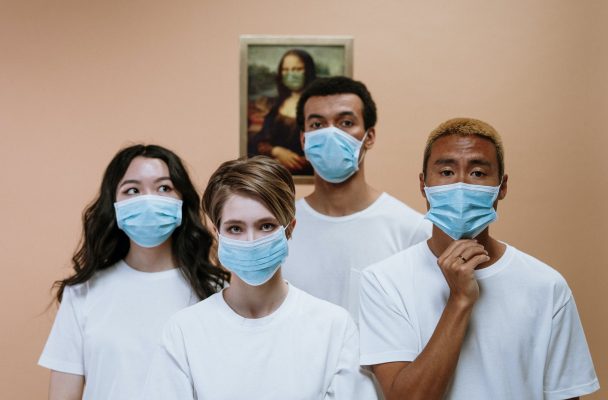Young people: please find your empathy

While some young people have followed CDC guidelines to help curb coronavirus transmission, some have adopted selfish and even deadly attitudes, acting in direct defiance of health officials’ orders.
By Delaney Geraghty
Staff Writer
“If I get corona, I get corona,” spring breaker Brady Sluder proclaimed in a CBS News video that subsequently went viral. “At the end of the day, I’m not going to let it stop me from partying.”
His comments incurred a slew of online backlash that has since led him to apologize for his insensitivity, but this problematic sentiment is not Sluder’s alone. Some young people, seemingly under the impression that a coronavirus diagnosis will be nothing more than another stint of the seasonal flu (and not taking into consideration the more vulnerable people they might spread the virus to) have adopted irresponsible attitudes towards the novel coronavirus.
But these attitudes aren’t simply selfish and wrong – they could be deadly.
Instead of taking this worldwide pandemic seriously, many young people continued with their crowded spring break vacations. When colleges extended spring break periods over concerns of students bringing the virus back to campus, some students opted to take that extra time and travel more, instead of self-isolating to curb any potential transmission.
Some continued to go out to packed restaurants and bars to party for St. Patrick’s Day. Then, when they could no longer congregate in these public places due to government-mandated closures, they hosted parties at their homes, completely missing (or flat out ignoring) the point of quarantining.
Some people aren’t disobeying social distancing rules simply out of ignorance – some are acting in direct defiance. In Kentucky, a group of young adults held a “coronavirus party” as a rebuke to the state’s social distancing guidelines. As of March 25, at least one person from that group tested positive for the coronavirus.
Social distancing presents one of, if not the single most effective method of preventing the spread of COVID-19 and flattening the curve. It’s imperative that we stay in our homes and limit outside contact as much as possible. But young people’s mistaken notion of invincibility, coupled with the extremely individualistic culture of the United States, makes advocating for self-isolation a hard battle to be won.
Although older adults and those with pre-existing conditions are the most at-risk of serious complications from the coronavirus, younger and seemingly healthy individuals can contract it too – and even die from it.
In an article published on April 6, CNN told the story of Ben and Brandy Luderer, a healthy millennial couple who both contracted COVID-19. Brandy’s symptoms were mild and manageable, but Ben’s symptoms grew increasingly severe. He died at the age of 30.
In South Korea, where coronavirus testing was incredibly widespread, almost 30% of positive cases as of March 14 were in the 20 to 29-year-old age group. But according to researcher Andreas Backhaus, only 3.7% of Italian coronavirus patients were in that same cohort, pointing to the idea that increased testing will show that many more young people are carriers of the virus than we think. Per a report by the Centers for Disease Control released March 18, up to 20% of coronavirus hospitalizations in the U.S. are adults between the ages of 20 to 44 years old.
Although it’s not impossible for young people without any underlying health conditions to develop serious symptoms or even die, the risk does remain low; most will experience only mild or moderate symptoms. But that isn’t the biggest issue at hand.
Even if a young adult can overcome the illness, he or she may spread it to someone else who won’t be able to. This is where problematic attitudes and actions become deadly.
Sure, if I was to contract the coronavirus, I would most likely be fine. But I could spread it to my 85-year-old grandfather, my asthmatic father or an hourly-wage worker who can’t afford to pay for treatment. All of these people could very well be added to the growing death toll in the U.S. because of my irresponsible actions.
According to Johns Hopkins Medicine, 31,071 Americans have died from COVID-19 as of April 16. And experts say we may not have reached the peak yet.
The coronavirus is not just “the spicy flu,” as one young Tik Tok creator bemoaned in a viral video expressing his desire to return to college. The CDC states that the overall death rate, though hard to pinpoint exactly, “is thought to be higher than that of most strains of the flu.”
Plus, COVID-19 is new to humans. We don’t have herd immunity yet, a vaccine, or even an all-encompassing knowledge of how the virus operates. All of these factors in and of themselves make the coronavirus more threatening than the average case of the flu.
Elderly people, people with impaired immune systems and those without health insurance are all members of our communities, and they deserve compassion and consideration. Yes, self-isolating takes discipline, can trigger an array of mental health issues and challenges the American ideal of personal freedom. But lives are at stake – hundreds of thousands of lives.
I implore you to think of the most vulnerable among us before you go to that party at your friend’s house. For you, a coronavirus diagnosis may just mean a few weeks of feeling under the weather.
But for someone you might spread it to, that same diagnosis could be a death sentence.